25-26 September 2022, Bình Duong, Vietnam
Horasis convened its annual Horasis India Meeting in Binh Duong New City, Vietnam on 25-26 September – co-hosted by Binh Duong Province, Becamex IDC and the Confederation of Indian Industry (CII). The meeting brought together 500 of the most senior members of the Horasis community to discuss and to inspire India’s future. Delegates from India and abroad also debated how to use Vietnam as hub for expansion into Southeast Asia – the country plays an important role in connecting India with other parts of Asia. Download the programme and report.
This 14th Horasis India Meeting was held during unprecedented global turmoil; it is to be hoped that the many conflicts are quickly ameliorated. Vietnam and Binh Duong Province in particular are to be commended for hosting the meeting. Vo Van Minh, Chairman of Binh Duong Province, Vietnam welcomed participants during the Welcome Reception.
Le Minh Khai, Deputy Prime Minister of Vietnam reviewed the progress in the bilateral relations between Vietnam and India. Vietnam remains an important pillar in India’s ‘Act East Policy’ and the ‘Indo Pacific Vision’. He also said that Vietnam’s open economy was exposed to external risks though the country’s gross domestic product (GDP) growth was expected to exceed 6.8 per cent this year, backed by robust exports and foreign investment. The country aims to keep inflation below 4 per cent next year. And Vietnam’s foreign exchange reserves had reached a record high of US$73 billion. Even so, the country’s pace of privatization of state-owned enterprises and pace of budget spending on infrastructure had been slower than expected.
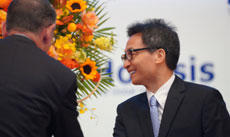 |
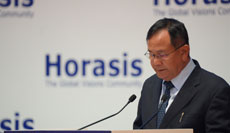 |
| Le Minh Khai, Deputy Prime Minister, Vietnam |
Rajkumar Ranjan Singh, Minister of State for External Affairs, India |
Indian Minister of State for External Affairs Rajkumar Ranjan Singh talking about Prime Minister Modi’s vision of ‘Aatma-Nirbhar Bharat’ highlighted the strides made by India on its way to achieve the target of making India USD 5 trillion economy. He welcomed the participating business leaders to join in and benefit from India’s growth story. The minister noted that over the past 50 years, the relationship between India and Vietnam has developed very well, and has the potential for further growth.
During the meeting, the business managers of Becamex signed a memorandum of cooperation with the Industrial Federation of India to explore greater innovation and sustainable development.
Speakers on the Opening Plenary noted there was a slight economic recovery in 2021. But now the economies of the EU are stretched and likely to be in recession in weeks. India, on the other hand with a GDP of $3.53 trillion is the world’s fifth-largest economy (IMF, 2022) though it is classed as a middle-income developing market economy. The country has one of the highest GDP growth rates in the world likely grow by 8-8.5% in FY22. Vietnam’s economy is expected to grow by 7.2% in 2022, on the back of a strong rebound in domestic demand and continued solid performance by export-oriented manufacturing. The Opening Plenary was chaired by Rajive Kaul, Chairman, Nicco Group; former President, CII, India with Shrinivas Dempo, Chairman, Dempo Group of Companies; President, AIMA, India; Anuj Kacker, Executive Director and President, Aptech, India; Lakshmi Prasad, Managing Director, Sujay Biotech, India and Van Dang, Founder and Chief Executive Officer, Savvycom, Vietnam serving as panelists.
Pranjal Sharma, Contributing Editor, Business Standard, India described Globalization over three factors – economic, political, cultural – and increasingly by ecological measures. Once international trade was slow and over land, but extensive – stretching from the Atlantic east to the Pacific. In a plenary panel entitled Are we Entering a New Era of Deglobalization? panelists Can Van Luc, President, BIDV Training and Research Institute, Vietnam; Nasser Munjee, Chairman, Tata Motor Finance, India; Inderdeep Singh, Managing Director, Continental Devices India, India and Vo Xuan Vinh, Professor, University of Economics, Ho Chi Minh City, Vietnam considered globalization to be of great benefit to economies and societies as ideas, meanings and values are diffused globally. But tied in are political mantra which have given rise to the present isolationism and inwards looking changes demanding a reshoring of goods that had been off-shored through globalization.
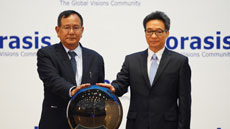 |
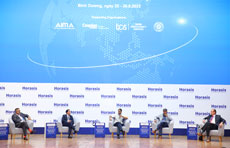 |
| The Ministers from India and Vietnam |
Panel asking – Are we Entering a New Era of Deglobalization |
Even before COVID-19 disrupted businesses and society, the Environmental, Social and Governance (ESG) movement was gaining momentum. Pressing challenges such as climate change and economic inclusion are accelerating the ESG adoption as organizations transform their businesses to become truly sustainable and gain competitive advantage. Speakers on the plenary The ESG Conundrum discussed how important ESG is today – how to measure its success. The session was chaired by Girish Ramachandran, President – Asia Pacific, Tata Consultancy Services, Singapore with Himanshu Gulati, Member of Parliament, Norway; Nguyen Thu Hien, Professor of Industrial Management, HCM University of Technology, Vietnam; Rajeev Peshawaria, Chief Executive Officer, Stewardship Asia Centre, Singapore and Michael Sharpe, National Director, Australian Advanced Manufacturing Growth Centre, Australia serving as panelists.
The global economic growth expectations for the current year are nearly half the growth last year and the medium-term outlook offers no comfort. India and Vietnam are among the bright spots in a generally dismal global economic outlook. Panelists of the session on Global Economic Outlook asked: What can India and Vietnam do to protect their GDP growth from the inflation shock and consolidate their gains from the shifts in global supply chains? What can India do to insulate its economic rebound from an inflation shock? The session was chaired by Vikram Chandra, Founder, Editorji Technologies, India. Speakers: Johan Nyvene, Chairman, Ho Chi Minh City Securities Corporation, Vietnam; Sudhir Jalan, Co-Chairman, Rieter India, India; JS Juneja, Chairman, Global Projects & Services, India; Don Lam, Chief Executive Officer and Founding Partner, VinaCapital, Vietnam. The session was introduced by Rekha Sethi, Director General, All India Management Association (AIMA), India.
In a plenary entitled Ensuring Growth via Sustainable Development. Pranjal Sharma, Contributing Editor, Business Standard, India asked which economic development model will allow greatest inclusive growth. Panelists Claude Béglé, Chairman, SymbioSwiss, Switzerland; Vishnu Narayan, Director, Ceyenar Chemicals, India; Nguyen Quang Huan, Chairman, Halcom, Vietnam and Vinod Sekhar, Chairman and Group Chief Executive Officer, Petra Group, Malaysia agreed that economic growth has to go along with an equally high rate of poverty reduction and fulfilling agreed SDGs. Poverty reduction planning began from a low base, but digitizing – especially of agriculture – is rapidly helping growth.
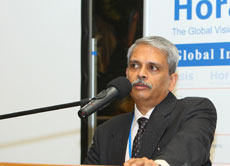 |
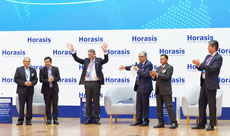 |
| Kris Gopalakrishnan, Chairman, Axilor Ventures, India |
Closing Plenary Panel |
The closing plenary was on India and Vietnam pivoting towards global roles. India has a long history as an Asian pivot, a point around which Asian ideas and trade have revolved and developed. Vietnam’s strong position is relatively new and determined by clear government initiatives. Both are buoyant post-COVID, being furiously entrepreneurial and innovative. Huynh Quang Hai, Vice Chairman, VSIP Group, Vietnam spoke of the amazing Vietnam-India relation despite the much lower population of Vietnam. Murat Seitnepesov, Chairman, Integral Group, Switzerland advised Vietnam and India to stay focused on economic development while avoiding political conflicts by engaging in neutral approaches with a readiness to address any setbacks and particular promotion of mutual supplemental strengths of the two nations. Kris Gopalakrishnan, Chairman, Axilor Ventures, India believed that Vietnam, for the time to come, would hold a vital role of rapid development and sustainable developmental target. B Thiagarajan, Managing Director, Blue Star Limited, India opined that the Horasis India Meeting 2022 was a chance for intensive cooperation and coordination for accompanied emergence as the leading economies in the new era.
The Closing Dinner was on India and Vietnam joining forces to trigger new growth initiatives. Both countries are strategic partners with deep economic relations and numerous common interests. What efforts need to be undertaken to further develop this partnership? How can Vietnamese and Indian firms partner to forge enhanced growth initiatives? Vo Van Minh, Chairman of Binh Duong Province, Vietnam said that with 29 industrial parks and 12 industrial clusters, the province has attracted more than 4,000 foreign direct investment projects with total capital of nearly US$40 billion from 65 countries and territories. The province has become the second-largest locality in the country in terms of foreign investment attraction, just behind Ho Chi Minh City. Nguyen Van Loi, Secretary of the Provincial Party Committee, Binh Duong, Vietnam affirmed that Binh Duong will create the best conditions for the connection and exchange between businesses and managers to be effective. He said that the Horasis India Meeting is an opportunity for organizations in Vietnam in general and Binh Duong in particular to access new knowledge and visions, grasp the trends and to build and develop socio-economically.
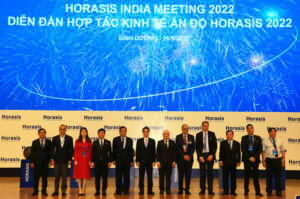 |
| Dignitaries on the stage |
Beginning in 2009, the Horasis India Meeting has become the foremost annual meeting of Indian business leaders and their global counterparts. With this meeting, Horasis offers business and government a platform to discuss a wide range of issues related to the Indian economy. Initially the location of the meeting rotated annually, and has been held in Munich (2009), Madrid (2010), Naples (2011), Antwerp (2012), Belfast (2013), Liverpool (2014), Interlaken (2015), Cascais (2016), Interlaken (2017), Malaga (2018), Segovia (2019) and virtually since 2020.
Horasis – a global visions community committed to inspiring our future – provides a unique platform for companies from emerging and developed markets to globalize their organisations. In addition to the Horasis India Meeting, Horasis hosts the annual Horasis Global Meeting, Horasis USA Meeting, Horasis China Meeting, Horasis Asia Meeting, as well as the annual gatherings of the Horasis Visionary Circle.
The co-chairs were:
 |
Claude Béglé, Chairman, SymbioSwiss, Switzerland |
 |
Gyanesh Chaudhary, Vice Chairman & Managing Director, Vikram Solar, India |
 |
Shrinivas Dempo, Chairman, Dempo Group of Companies; President, AIMA, India |
 |
Don Lam, Chief Executive Officer and Founding Partner, VinaCapital, Vietnam |
 |
Kris Gopalakrishnan, Chairman, Axilor Ventures, India |
 |
Huynh Quang Hai, Vice Chairman, VSIP Group, Vietnam |
 |
Sudhir Jalan, Co-Chairman, Rieter India, India |
 |
Anuj Kacker, Executive Director and President, Aptech, India |
 |
Rajive Kaul, Chairman, Nicco Group; former President, CII, India |
 |
Siva R Krishnan, Deputy Chief Executive Officer & Chief Risk Officer, TechcomBank, Vietnam |
 |
Sanjay Mehta, Founder, 100x.vc, India |
 |
Nasser Munjee, Chairman, Tata Motor Finance, India |
 |
Vishnu Narayan, Director, Ceyenar Chemicals, India |
 |
Rajeev Peshawaria, Chief Executive Officer, Stewardship Asia Centre, Singapore |
 |
Lakshmi Prasad, Managing Director, Sujay Biotech, India |
 |
Nguyen Quang Huan, Chairman, Halcom, Vietnam |
 |
Johan Nyvene, Chairman, Ho Chi Minh City Securities Corporation, Vietnam |
 |
Girish Ramachandran, President – Asia Pacific, Tata Consultancy Services, Singapore |
 |
Murat Seitnepesov, Chairman, Integral Group, Switzerland |
 |
Vinod Sekhar, Chairman and Group Chief Executive Officer, Petra Group, Malaysia |
 |
Michael Sharpe, National Director, Australian Advanced Manufacturing Growth Centre, Australia |
 |
B Thiagarajan, Managing Director, Blue Star Limited, India |








I am confident India will continue its historic highs of inwards foreign investment.
Piyush Goyal, Minister of Commerce & Industry, Textiles, Consumer Affairs, Food & Public Distribution, India
Many government paper-chases have now been substituted by fully digitized modes: thus, supporting being a responsive government caring for 1.3 billion people.
Chandrajit Banerjee, Director General, Confederation of Indian Industry (CII), India
Unfortunately, women are less vaccinated than men, more so rurally where social norms dictate, they have restricted mobility outside of their homes.
Preetha Reddy, Vice Chairperson, Apollo Hospitals, India
The basic lesson is that India needs to boost its rural health care capacity including training and using technology. All must accept transformative cooperation.
Sunil Kant Munjal, Chairman, Hero Corporate Services, India
Much of the Indian economy reacted positively in its initial resilience; indeed, economic recoveries have been rapid.
Naushad Forbes, Co-Chairman, Forbes Marshall, India
Manufacturing firms have had to reorganize their product lines, and in many cases incorporate greater levels of robotization and AI.
Rekha M. Menon, Chairperson and Senior Managing Director, Accenture
The Indian economy cannot be isolated from global supply chains. And it must acquire much more inward investment.
Vineet Mittal, Chairman, Avaada Energy, India
Foresight and hard work is supporting Madhya Pradesh
Shivraj Singh Chouhan, Chief Minister, Madhya Pradesh, India